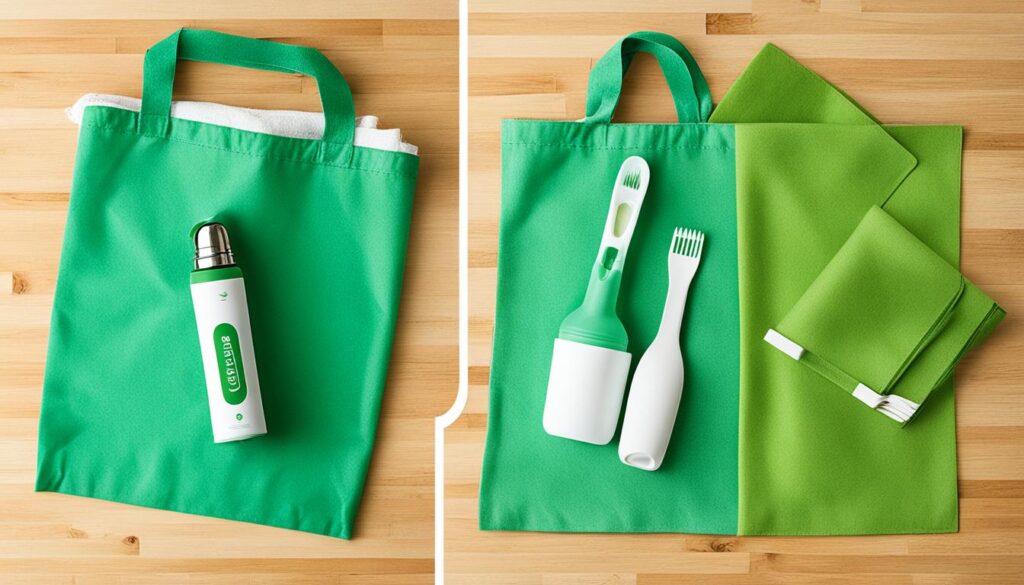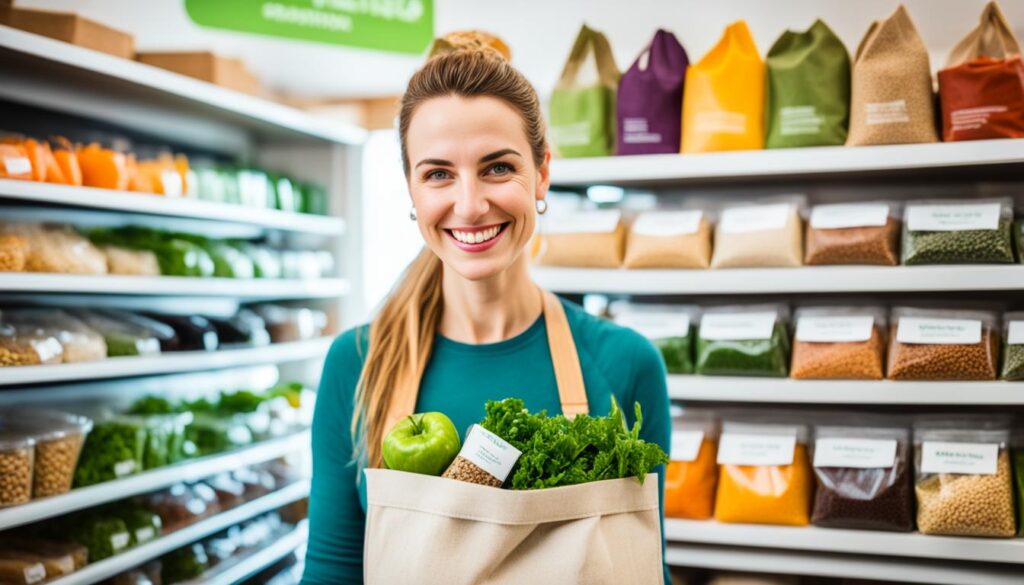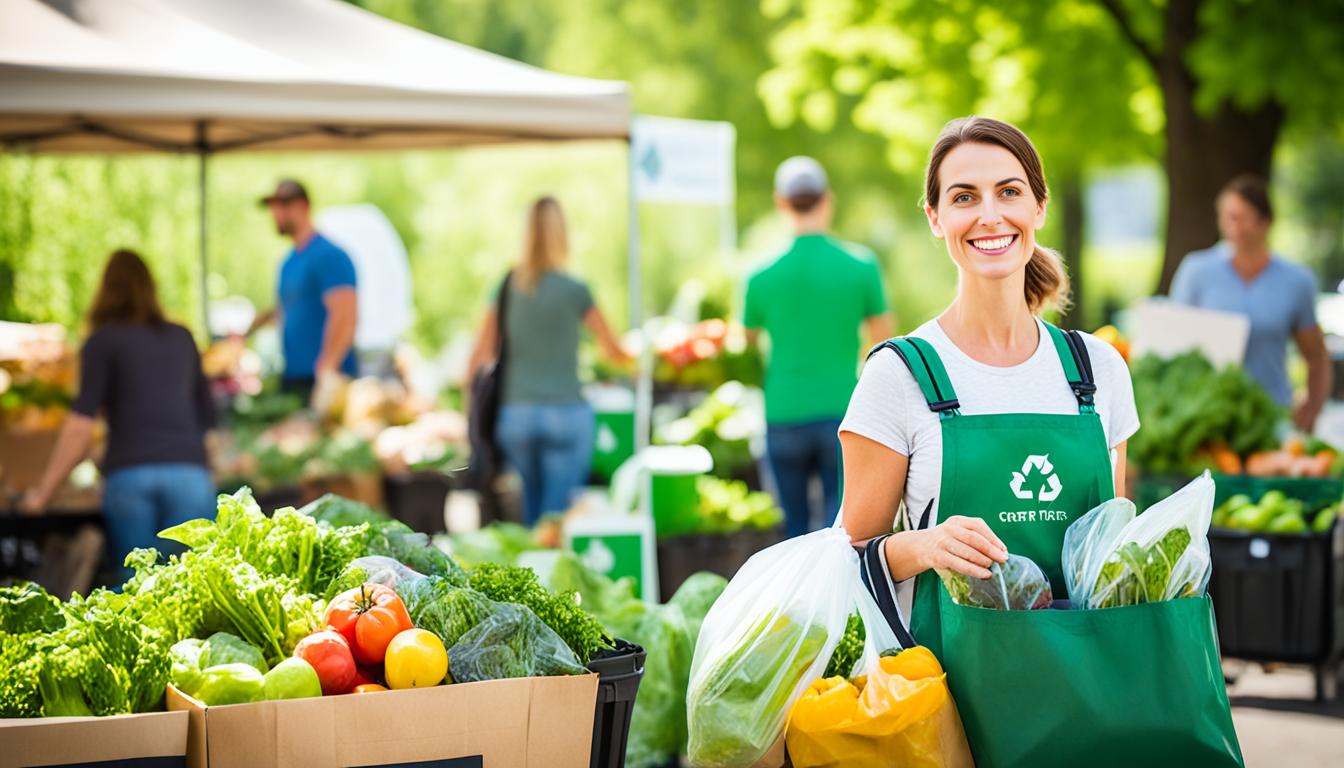Every journey starts with a spark of awareness and a strong intention to change the future. My journey towards living sustainably began in 2015. I realized that every small choice I made could help fix our damaged environment. It wasn’t about making big changes right away. It was about adding eco-friendly living tips to my everyday life.
The question of how to start a zero waste lifestyle is unique to each person. It’s about finding your own way to live more sustainably. Let’s explore this journey together, learning and growing as we go. We’ll discover how to make our world a better place, one small step at a time.
Key Takeaways
- Starting a zero waste lifestyle is a deeply personal and evolving journey.
- Even amidst a linear economy, making eco-friendly choices is crucial.
- Learning and applying sustainable living practices can significantly reduce waste.
- Small steps taken by individuals can lead to substantial collective impact.
- Zero waste living is about progress, not perfection, and every effort matters.
Understanding the Zero Waste Philosophy
Living a zero waste lifestyle means deeply caring for our planet. It’s more than just saying no to plastic bags or recycling. It’s about changing how we live and what we buy every day. At its core, it’s about a circular economy. We aim to reduce waste and turn old items into new ones, creating a cycle that never ends.
For those starting with zero waste tips for beginners, this idea can change how you see waste. In a zero waste world, every item has a value. By living sustainably, we show we care for the earth. Our actions can make a big difference worldwide.
Living waste-free means looking at what we buy and use differently. We aim to waste less, not because we’re missing out, but because we think about how our choices affect the earth.
| Principle | Application | Outcome |
|---|---|---|
| Refuse | Decline single-use plastics | Reduces waste in landfills |
| Reduce | Minimalize possessions | Less resource use and waste |
| Reuse | Repurpose items creatively | Extends the life cycle of products |
| Recycle | Proper segregation of waste | Materials are reprocessed into new products |
| Rethink | Choose products designed for longevity | Promotes sustainable production and consumption |
Starting a zero waste life is rewarding, with its ups and downs. It’s not about changing everything at once. It’s about making small, steady changes. By doing so, we help create a better future, showing that every step counts for our planet.
Debunking Zero Waste Myths
Starting a zero waste journey is a great step, but it’s important to clear up some common misconceptions. These myths might discourage or mislead beginners. Let’s clear up some of these myths and offer real environmentally friendly tips.
The ‘Mason Jar’ Fallacy
Many of us have seen the image of a mason jar filled with years’ worth of trash, showing the goal of zero waste. But this image often sets a standard that’s too high for most people. A single jar can’t capture the complexity of daily waste or the effort needed to reduce it.
Instead, a guide to going zero waste should focus on making small changes. It should aim for progress, not perfection.
Zero Waste Is Never Truly Zero
It’s important to understand that ‘zero’ waste doesn’t mean you won’t produce any waste at all. The goal is to greatly reduce waste as much as possible. Modern life, with its focus on consumerism and disposability, makes complete waste elimination rare.
But, significant reduction is definitely possible and beneficial. Knowing this can make the transition to zero waste easier and more sustainable.
Inequities within the Zero Waste Movement
One big challenge in adopting zero waste habits is the issue of socio-economic disparities. Not everyone can easily access bulk stores or eco-friendly products that are affordable. Things like where you live, your income, and how busy you are affect your ability to go zero waste.
By understanding these challenges, we can work towards a more inclusive zero waste movement. We should focus on being adaptable and considering personal circumstances, rather than expecting everyone to follow the same path.
How to Start a Zero Waste Lifestyle, Zero Waste Tips for Beginners
Starting an eco-friendly journey takes both motivation and action. For those new to it, zero waste tips for beginners can make it easy. It’s all about reducing waste at home, which is easier than it seems with the right mindset.
I began by doing a waste audit. This showed me what kind of waste I was making and what changes I needed to make at home. Here are some easy eco-friendly living tips I followed:
- Replacing single-use items with reusable ones, such as cloth bags and water bottles.
- Choosing sustainable personal care products like bamboo toothbrushes and shampoo bars.
- Making meals at home more often to cut down on packaging waste from takeout and processed foods.
Changing to an eco-friendly lifestyle isn’t about being perfect. It’s about making better choices step by step. The idea is to improve gradually, getting used to new habits over time.
The aim isn’t to stop waste right away but to build sustainable habits. Each small change helped reduce my environmental impact. This showed me the importance of reducing waste at home.
For beginners, remember that every small step helps. Embrace the learning and adapting process. Enjoy the positive change you’re making for our planet.
Conducting a Waste Audit: A Starting Point
Starting a beginner zero waste journey means knowing what you throw away. A waste audit is key to starting sustainable living practices. Here’s how I began my zero waste habits with a waste audit.
Tracking Your Trash
I started by gathering all trash from a week. This included food packaging, broken items, and even receipts. I recorded every item, big or small, for a full view.
Identifying Waste Patterns
After a week, I sorted the waste by type—plastics, organics, paper, and more. Seeing it all laid out was shocking. But it showed me where I could make big changes to help the environment.
| Type of Waste | Quantity |
|---|---|
| Plastic | 40% |
| Organic Waste | 30% |
| Paper | 20% |
| Others | 10% |
This audit gave me important insights. It helped me start adopting zero waste habits and improve my sustainable living practices. Understanding your waste habits is key when starting your beginner zero waste journey.
Creating a Tailored Zero Waste Kit
Creating a personalized zero waste kit has changed my life. It’s about making simple choices every day to live more sustainably. If you want to start zero waste habits, here’s how to make a kit that fits your daily needs. It will help you live more eco-friendly.
- Reusable Water Bottle: Ditch the plastic bottles. A strong, reusable water bottle is not only good for the planet but also looks great.
- Coffee Cup: For coffee lovers, a reusable cup is a must. It keeps your coffee warm and cuts down on waste from daily coffee trips.
- Cloth Bags: Cloth bags are versatile and long-lasting. They’re perfect for groceries, books, or any errands, helping you avoid plastic bags.
- Produce Bags: Use reusable produce bags for your fruits and veggies. This small change greatly reduces plastic use.
Every item in my zero waste kit has a purpose. It makes it easier for me to keep up with zero waste habits every day. Being prepared is key to living waste-free. With these essentials, I’m always ready to choose an eco-friendly option, wherever I am. It’s rewarding to know my choices help the planet.
If you want to reduce your environmental impact, start with a zero waste kit that fits your life. Remember, small steps can make a big difference for our planet!
Zero Waste Swaps for Everyday Use
Starting with zero waste tips for beginners means making simple changes in our daily lives. These changes help a lot in reducing waste at home and living eco-friendly. We can switch many single-use items for sustainable ones. This saves money and helps the environment.
From Plastic to Bamboo: Choosing Sustainable Materials
I started using sustainable materials to live a zero waste life. I switched from plastic toothbrushes to bamboo ones and from synthetic sponges to natural loofahs. These changes might seem small, but they make a big difference over time.
Reusable Alternatives to Single-Use Items
Switching to reusable items like stainless steel water bottles is key. I also use beeswax wraps to keep food fresh without plastic. These reusable alternatives are not only useful but also look good and last a long time.

These changes have greatly reduced my trash and inspired others in my community to think about their habits. Sharing these zero waste tips for beginners is part of my effort to promote a greener planet.
Going Beyond Packaging: A Holistic Approach to Waste
When we talk about the zero waste lifestyle, we often focus on cutting down on packaging. But what about the other things that affect the environment? For me, living sustainably means looking at every part of my life and making eco-friendly choices.
It begins with looking at what I use and how I use it every day. This includes the food I eat, how I travel, and the electronics I use. Every choice I make can be made better for the planet.
- Assessing the sustainability of my diet: Opting for locally produced, plant-based options can dramatically reduce my carbon footprint.
- Smart travel choices: Choosing public transport, carpooling, or bicycle rides over solo car journeys.
- Energy-efficient appliances: Investing in household items that conserve energy, leading to long-term ecological and financial savings.
But the goal of a zero waste lifestyle goes beyond just my choices. It also means pushing for big changes. Supporting products that are good for the planet and pushing for policies that protect our environment are key steps.
To really live sustainably, I always look for the best environmentally friendly tips. I share these tips with my community too. It’s about making choices that help the planet at every turn.
In conclusion, reducing waste is not just about doing certain things. It’s a way of thinking. By living this way, every choice I make helps our planet. It ensures that I’m working towards a sustainable future.
Embracing a zero waste lifestyle is as much about the small, everyday decisions as it is about major lifestyle changes.
By learning and taking action, we can all help make the world healthier and more sustainable.
Zero Waste in the Kitchen: Meal Planning and Smart Shopping
Starting to live more eco-friendly can begin in the kitchen. It’s a key spot in many homes. By focusing on meal planning and smart shopping, we can move towards a zero waste life.
Meal planning helps reduce waste at home. By planning meals for the week, I cut down on food waste. This saves resources and money too.
Smart shopping goes hand in hand with meal planning. Buying in bulk and using reusable bags and containers cuts down on packaging waste. Here are some tips to shop smarter and keep living waste-free.

| Strategy | Benefits |
|---|---|
| Buy in Bulk | Reduces packaging waste and often lowers the cost per unit. |
| Choose Local and Seasonal Produce | Supports local farmers and reduces carbon footprint due to shorter transportation routes. |
| Use Cloth Produce Bags | Eliminates the use of single-use plastic bags and can be reused many times. |
| Compost Organic Waste | Converts waste into a resource, enriching soil without the need for chemical fertilizers. |
These tips for the kitchen help reduce waste and encourage a healthier lifestyle. By making these choices, we protect our planet and aim for a cleaner future.
Zero Waste and Your Budget: Financial Benefits of Sustainable Living
Starting my zero waste journey showed me that it’s good for the planet and my wallet. Many think going zero waste costs a lot, but it doesn’t have to.
Cost-Efficient Zero Waste Habits
Switching to zero waste saved me money right away. Using a single water filter instead of disposable bottles and cloth towels instead of paper ones cut my weekly bills. Here’s how some zero waste changes affected my costs over two years:
| Item | Initial Cost | Cost Over 2 Years (Without Zero Waste) | Cost Over 2 Years (With Zero Waste) |
|---|---|---|---|
| Water Filter | $35 | $520 | $35 |
| Cloth Towels (Pack of 5) | $30 | $260 | $30 |
| Reusable Silicone Bags | $25 | $180 | $25 |
Investing in Quality Over Quantity
My zero waste journey also taught me to value quality over quantity. At first, buying quality items seemed scary. But choosing durable items meant I bought less, which saved money and reduced waste. I picked items that do more and last longer, making my life simpler and my wallet happier.
These changes didn’t just help the environment; they made me spend less and save more. If you want to start living sustainably, remember, zero waste doesn’t mean spending more. It’s a way to save money and respect the planet.
Joining the Zero Waste Community: Support and Inspiration
Starting a zero waste journey can feel tough at first. But, finding support in a zero waste community can make it exciting. For those new to zero waste, connecting with others is key.
Finding a Zero Waste Tribe
Finding people who think like you is crucial. It could be an online group, a social media club, or a local meetup. These communities offer great advice and motivation. They let you share tips and stories, which is vital for beginners.
Being part of a group keeps you updated on new sustainable habits. It also inspires you to keep improving your daily life.
Sharing Experiences and Challenges
Talking about your wins and struggles helps everyone learn and grow. In these groups, sharing your challenges and how you overcame them helps everyone. It shows that going zero waste is a journey we all take together.
Community support helps in many ways:
- Motivation: Seeing others succeed motivates you.
- Innovation: Group talks can lead to new zero waste ideas.
- Support: Having a group to lean on during hard times is priceless.
The path to zero waste is better with friends. Being part of a group boosts personal growth and helps the global movement.
Conclusion
Starting a zero waste lifestyle feels like a new chapter in my life. It’s filled with intention and care for the planet. I learned about the zero waste philosophy, seeing how our choices help the environment.
It’s a journey, not a goal. It’s about making positive choices and building good habits. If you’re starting, remember it’s about progress, not perfection.
Doing a waste audit showed me how much waste I produced. It made me realize I needed a special plan and the right tools for a green life. Sharing my journey and getting support from others has helped me stay on track.
Together, we can make a difference. Our goal is to live sustainably. This shared dream brings us together, showing that we can make a change.
My journey into eco-friendly living has shown me it’s possible. It started with small steps, but now I see a bright future. Every action I take helps the planet. Let’s work together for a greener tomorrow, one step at a time.
FAQ
How can I start a zero waste lifestyle?
Start by checking your waste with a waste audit to see where you can change. Make eco-friendly swaps like reusable bags and water bottles. Build a zero waste kit for your daily needs.
Learn about sustainable living and connect with others for support. This will help you on your zero waste journey.
What is the Zero Waste philosophy?
The zero waste philosophy wants to change how we make and use things to avoid waste. It pushes for a circular economy where things are reused and given new life. It’s more than just cutting down on plastic; it’s a big change to reduce waste in all parts of life.
What are some common myths about zero waste living?
One myth is the ‘Mason Jar’ idea that you can fit all your trash in one jar. Another myth is thinking zero waste means making no waste at all, which isn’t possible in our current economy. It’s also key to see how the zero waste movement can unfairly affect people’s ability to reduce waste.
What should I include in my zero waste kit?
Your zero waste kit should fit your life. It could have reusable water bottles, coffee cups, cloth bags, and produce bags. Add any items that help you avoid single-use plastics and disposables.
What are zero waste swaps I can use every day?
Easy swaps are using a bamboo toothbrush instead of plastic, and stainless steel razors instead of disposable ones. Choose reusable bottles and coffee cups, beeswax wraps over cling film, and cloth bags over plastic ones.
How does a zero waste lifestyle go beyond just packaging?
Living zero waste means thinking about the sustainability of our diets and the environmental impact of what we buy. It’s about thinking big, from the food we eat to how we travel. It’s a way of life that aims to reduce waste in every area.
How do I manage zero waste in my kitchen?
Begin with meal planning to cut down on food waste. Shop smart by buying in bulk and choosing items with less packaging. Support local farmers and compost your food scraps.
Use cloth produce bags and reusable containers for storing food.
Can a zero waste lifestyle save me money?
Yes, buying reusable items can save you money over time. A minimalist approach can stop you from buying things you don’t need. Making your own cleaning products can also be cheaper in the long run.
How can I get involved with the zero waste community?
Find local or online groups focused on living sustainably. Join zero waste forums, go to workshops, or attend events about zero waste. Sharing your journey and challenges with others can be inspiring and helpful.



